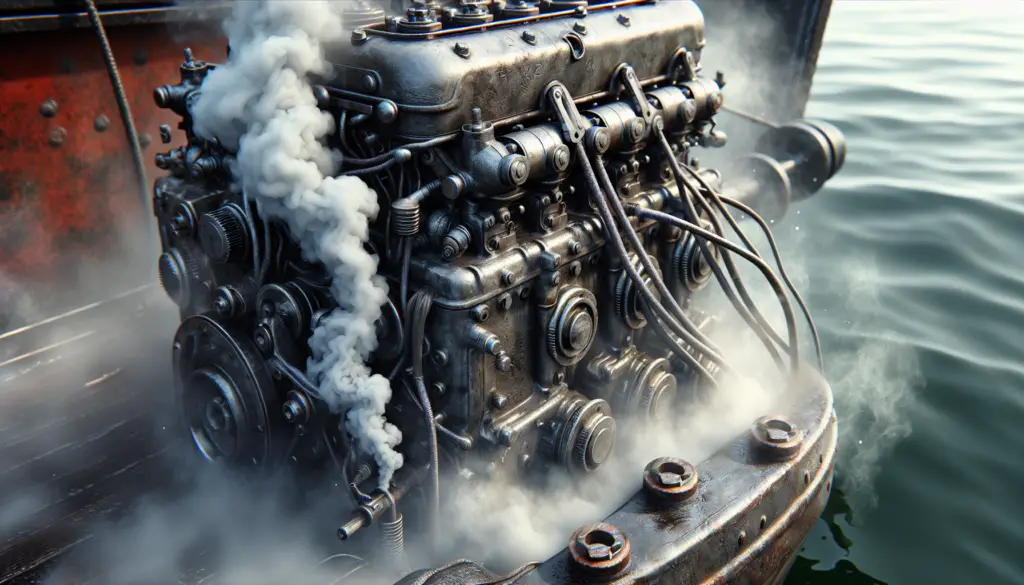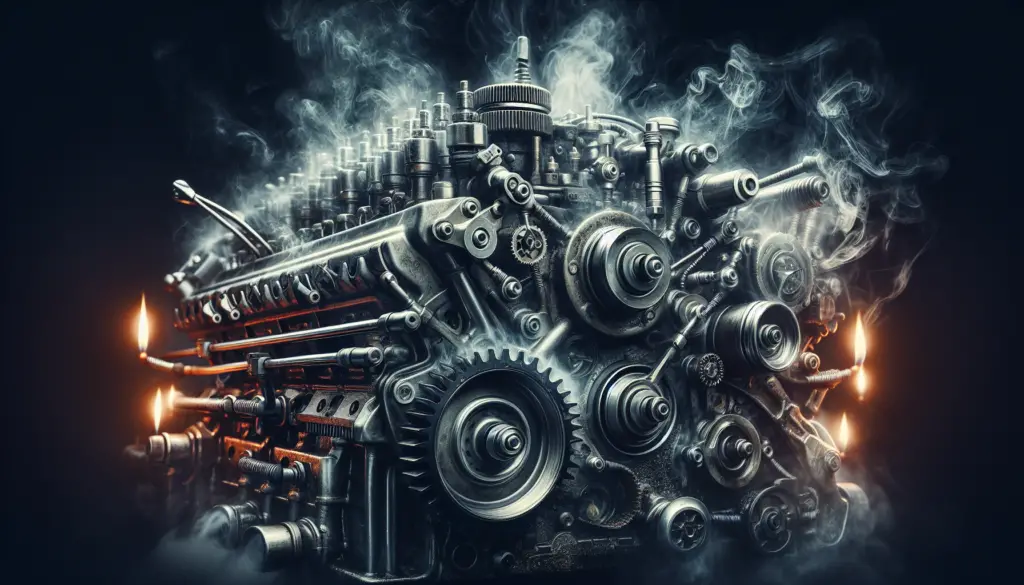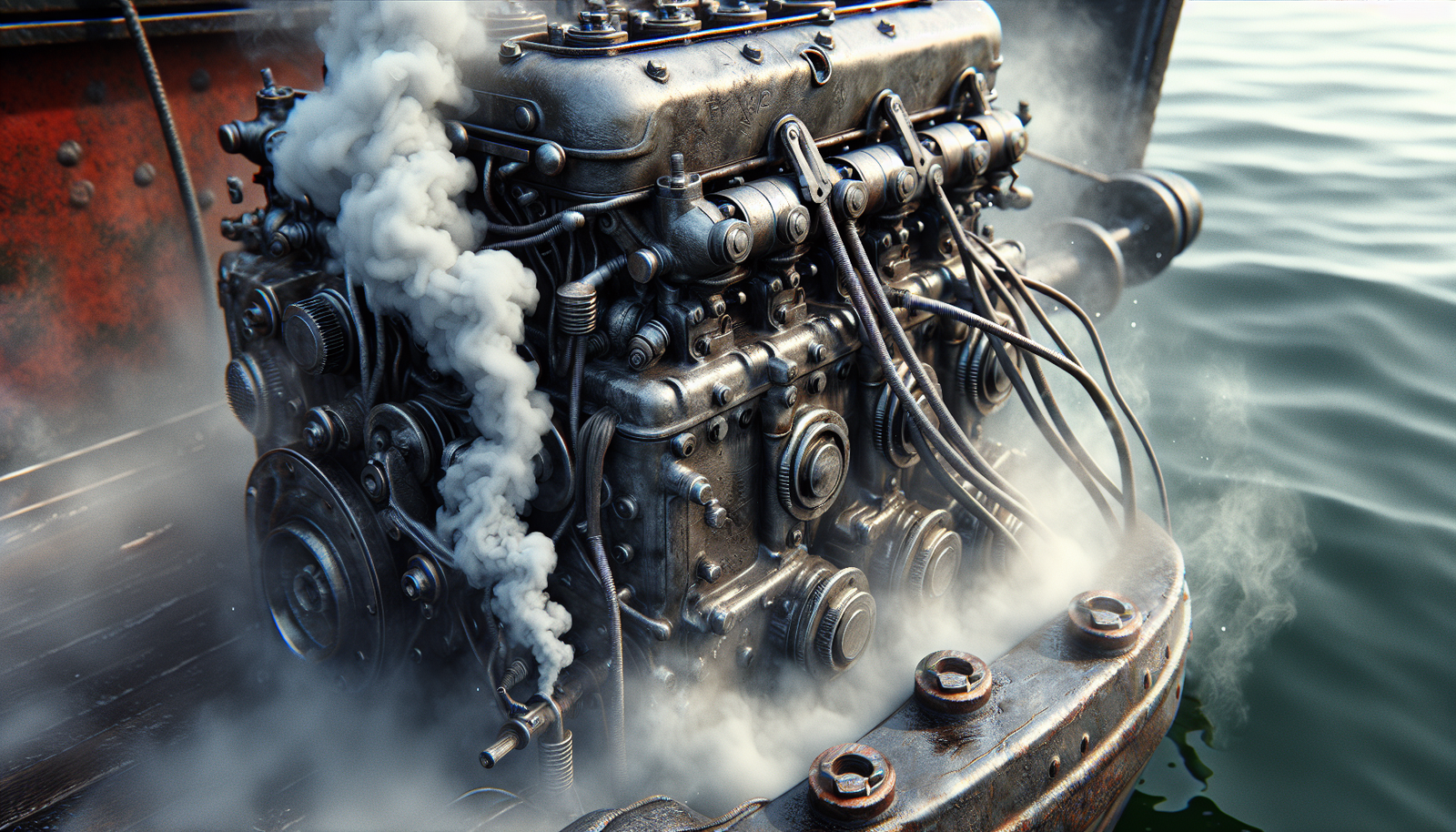Ever been out on the water, feeling the wind in your hair, when suddenly your boat engine starts puffing out clouds of smoke? Well, ‘Boat Engine Troubleshooting for Excessive Smoke’ is the perfect guide for you. It provides detailed step-by-step instructions on how to figure out why your boat engine is overly smoking and offers practical solutions to ensure your engine runs smoothly again. This comprehensive guide will seriously enhance your ability to tinker with your boat engine and keep your maritime construction in tip-top shape for many offshore adventures to come!

Understanding the Type of Smoke
When it comes to boat engine troubleshooting, one of the most significant ways you can get a head start is by understanding the type of smoke that your boat is producing. This can allow you to identify potential problems and take necessary measures to address them timely.
Identifying the colour of smoke
Smoke colour can differ based on the type of issue your boat might be dealing with. White smoke typically indicates the presence of water in the combustion chamber, while blue or black smoke could mean an issue related to fuel or oil.
Connecting the colour of smoke to potential problems
The colour of the smoke can provide clues about possible engine problems. White smoke could be a sign of a coolant leak, or moisture trapped within the engine. On the other hand, blue or black smoke could signal a problem with the fuel or oil. Inefficient combustion, which can cause black smoke, might indicate that your engine’s fuel is not being used adequately.
Effect of smoke density on engine issues
The density of the smoke can also reveal details about your engine’s issues. For instance, denser smoke implies that your boat’s engine is releasing larger particles into the air. This often points towards a severe engine problem. Thus, if you notice thick, heavy smoke exiting your boat, consider seeking professional help immediately.
Engine Oil Related Issues
Engine oil forms an essential part of your boat’s engine, aiding in its smooth functioning.
Excessive or incorrect oil
Using excessive oil or incorrect oil type can lead to numerous engine issues. Overfilling the oil can cause it to foam and break down, reducing its cooling and lubricating properties. On the other hand, using the wrong type of oil can also lead to an array of issues. Check your engine manual to find the recommended oil type and quantity.
Potential for blockages in the engine
Improper usage of engine oil can cause sludge to build up, leading to blockages in the engine. Regular cleaning can help prevent this smeared, dark substance from creating obstructions in the oil passages and restricting flow.
Issues with the oil pump
A faulty oil pump can lead to insufficient oil circulation, adversely affecting the engine’s lubrication and cooling processes. This can potentially lead to engine overheating, causing smoke to be emitted from it.
Understanding the role of proper lubrication
Proper lubrication is key to the smooth functioning and longevity of your boat’s engine. Inadequate lubrication can lead to friction and overheating, causing wear and tear and, in some cases, complete engine failure.
Fuel System Problems
Your boat’s performance and fuel efficiency depend significantly on the quality of fuel and its delivery system.
Effects of bad quality fuel
Bad quality fuel can cause several issues, ranging from poor engine performance to serious engine damage. It can lead to clogged fuel lines or injectors, cause the engine to run unevenly, and even lead to excessive smoke production.
Common issues with the fuel pump
An underperforming or failing fuel pump can cause your engine to run rough, lose power, or smoke excessively. To spot any issues promptly, regularly check your fuel pump for any visual damages or irregularities.
Hazard of clogged or dirty fuel filters
Clogged or dirty fuel filters limit the amount of fuel reaching the engine, impairing its overall performance. If your engine is smoking excessively, perform a quick check of your fuel filters to see if they need replacing.
Possible issues with injectors or carburetors
Faulty injectors or carburetors can cause fuel to mix improperly with air, causing excessive smoke. If your engine is smoking, it might be due to an issue with these components.
Air Supply and Ventilation Problems
Air supply and ventilation play a crucial role in your engine’s combustion process and can significantly influence its efficiency and smoke emissions.
Impact of insufficient air supply
An insufficient air supply can lead to incomplete combustion, causing your engine to emit smoke. It’s important to ensure that your engine receives an adequate amount of air for efficient operation.
Common blockage issues in the air vents
Blockages in the air vents can impede the flow of air to the engine, causing inefficient combustion and increasing smoke emissions. Regular inspection and cleaning of your air vents can help alleviate these issues.
Problems with the air filters
Dirty or clogged air filters can restrict the amount of air reaching the engine, causing it to operate inefficiently and produce excessive smoke. Regularly cleaning or replacing your air filters can vastly improve your engine’s performance.
Importance of good ventilation
Good ventilation ensures that the combusted gases are effectively expelled, making room for fresh air to enter. Poor ventilation can lead to the buildup of these gases, which can cause your engine to smoke excessively.

Overheating of the Engine
Overheating engines are a common reason for boat engine smoke.
Signs of an overheated engine
Signs of an overheated engine could include reduced engine power, an unusually high engine temperature reading, or a warning light.
Causes for overheating
Engine overheating can occur due to various reasons, such as issues with the cooling system, blockages in the passages, worn-out parts, or an insufficient amount of coolant.
Hazards of an overheated engine
An overheated engine can cause significant damage to the engine parts. It can lead to significant wear and tear, severe engine damage, and excessive smoke production.
Methods for managing overheating
Regularly check and maintain your engine’s coolant level, ensure proper circulation of coolant, and keep your engine’s parts clean to prevent overheating.
Engine Timing and Combustion Problems
Proper engine timing and efficient combustion are essential for your engine’s smooth functioning. Any inconsistencies can cause your engine to produce excessive smoke.
How improper timing can cause smoke
Improper timing of the ignition spark can lead to inefficient combustion, causing smoke. If the timing is too advanced or too delayed, it can cause the fuel-air mixture to ignite at the wrong time, leading to smoke emission and loss of engine power.
The role of spark plugs
Spark plugs play a crucial role in the combustion process. Faulty spark plugs can cause inefficient combustion, which can lead to excessive smoke production.
Common issues with ignition and combustion
A defective ignition system or poor combustion can result in a rich fuel-air mixture, which can lead to excessive smoke. Regular checking and maintenance of these elements can help in reducing smoke emissions.
Potential impact of incorrect valve adjustments
Incorrect valve adjustments can disrupt the efficient combustion process, leading to poor engine performance and excessive smoke production. Therefore, proper valve adjustment is crucial for optimal engine operations.
Trouble with Exhaust System
Your boat’s exhaust system plays a critical role in venting gases from the engine, and any issues with this system can lead to the production of excessive smoke.
Warning signs of an exhaust system problem
Some warning signs of an exhaust system problem include increased engine noise, reduced power and acceleration, and excessive smoke emission.
Issues with manifold or exhaust pipes
Cracks or holes in the manifold or exhaust pipes can lead to leakage of exhaust gases, leading to an increase in smoke production.
Turbocharger or supercharger problems
As turbochargers and superchargers help in efficient burning of fuel, any problems with these components can lead to the engine producing excessive smoke.
Role of water separators and mufflers
Water separators and mufflers help in reducing smoke emission by separating water from the fuel and minimizing engine noise. A problem with these components can lead to increased engine smoke.
Engine Wear and Tear
Even with regular maintenance, your engine will experience some degree of wear and tear over time.
Recognizing signs of normal versus excessive wear
While some engine wear over time is normal, excessive wear can lead to significant engine issues and smoke production. Signs of excessive wear include decreased engine performance and unusual noises.
Common problems from worn pistons and cylinders
Worn pistons and cylinders can cause a loss of pressure in the engine, leading to inefficient combustion and increased smoke emission.
Issues with bearings and seals
Worn-out bearings and seals can also lead to an increase in engine smoke. Problems such as oil leaks or unusual noises could signify that these elements need replacement.
Correlation between engine lifespan and smoke production
As the lifespan of an engine increases, so does the potential for smoke production, which is often due to increased wear and tear. Regular maintenance and part replacement can help to reduce smoke output.
Maintenance Practices to Limit Smoke Production
Regular maintenance of your boat’s engine can help keep smoke production to a minimum.
Importance of regular tune-ups
Regular tune-ups can prevent many engine issues and keep your engine running efficiently, helping to reduce smoke emission.
Role of regular cleaning
Regular engine cleaning can prevent the buildup of dirt, dust, and grime, which can affect its performance and lead to excessive smoke production.
Correct selection and use of engine oil
Using the correct type and amount of engine oil can enhance your engine’s performance and extend its lifespan, helping to reduce smoke output.
Proper fuel quality and treatment
Using high-quality fuel and treating it correctly can improve the efficiency of your engine, helping to reduce smoke emission.
When to Seek Professional Help
It’s important to know when to seek professional help for your engine issues.
Recognizing when DIY repairs are insufficient
While you can carry out basic engine maintenance and troubleshooting, some issues require professional attention. If your DIY repairs don’t resolve the issue or if the problem continues to recur, it may be time to call a professional.
Finding a qualified marine mechanic
When looking for a mechanic, ensure they are fully qualified and experienced in dealing with boat engines. Check their credentials and ask for references to make sure you’re entrusting your boat to competent hands.
Importance of regular professional inspections
Regular professional inspections can catch potential issues early on, helping you to avoid costly repairs or replacements in the future.
Assessing cost vs benefit for engine replacement or rebuild
Sometimes, if an engine is old or severely damaged, it may be more cost-effective to replace or rebuild it instead of carrying out numerous repairs. A professional can help you assess the cost against the benefits to help you make an informed decision.

